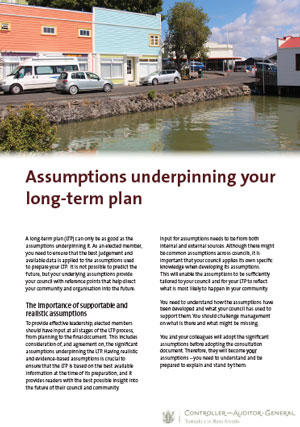Assumptions underpinning your long-term plan
A long-term plan (LTP) can only be as good as the assumptions underpinning it. As an elected member, you need to ensure that the best judgement and available data is applied to the assumptions used to prepare your LTP. It is not possible to predict the future, but your underlying assumptions provide your council with reference points that help direct your community and organisation into the future.
The importance of supportable and realistic assumptions
To provide effective leadership, elected members should have input at all stages of the LTP process, from planning to the final document. This includes consideration of, and agreement on, the significant assumptions underpinning the LTP. Having realistic and evidence-based assumptions is crucial to ensure that the LTP is based on the best available information at the time of its preparation, and it provides readers with the best possible insight into the future of their council and community.
Input for assumptions needs to be from both internal and external sources. Although there might be common assumptions across councils, it is important that your council applies its own specific knowledge when developing its assumptions. This will enable the assumptions to be sufficiently tailored to your council and for your LTP to reflect what is most likely to happen in your community.
You need to understand how the assumptions have been developed and what your council has used to support them. You should challenge management on what is there and what might be missing.
You and your colleagues will adopt the significant assumptions before adopting the consultation document. Therefore, they will become your assumptions – you need to understand and be prepared to explain and stand by them.
The significant assumptions to focus on
The future is uncertain and transparency about the potential impact of that uncertainty is important in preparing the LTP. For the 2021-31 LTP, matters such as Covid-19, the future impacts of climate change, and the three waters reforms will be front of mind. They create additional uncertainty. Your council will need to develop assumptions to cover each of these matters.
Some of your council’s significant assumptions are more uncertain or provide greater risk than others. The more risky and uncertain the assumption, the more focused attention and challenge you should apply to it. You should ensure that this uncertainty and risk is adequately explained in your LTP. Key assumptions underpinning your LTP are likely to include:
- the Covid-19 downturn and recovery assumptions. These will affect other assumptions, such as those related to population growth, other demand changes, and funding sources (including revenue from your council-controlled trading organisations). Although the full implications of Covid-19 are still unclear, and will remain so for some time, it is likely that some of the assumptions councils previously made about the future (for example, in the 2020/21 annual plan) will need to be revisited. We will cover other Covid-19-related issues in our next bulletin;
- your council’s assumptions about a changing climate. Your LTP should reflect how the expected effects of the changing climate will impact your council’s operations, service levels, and planned responses;
- for territorial authorities, assumptions about your council’s delivery of water and wastewater services. It is uncertain how, and to what extent, the proposed three waters reforms will take effect, and based upon our current understanding of timelines, this is not expected to be resolved by 30 June 2021. This means that your LTP should be based on the assumption that your council will continue to provide water and wastewater services;
- your council’s asset assumptions. Your LTP should contain maintenance and renewal forecasts that are based on realistic and reliable information about asset condition and performance;
- your council’s ability to deliver its planned capital expenditure. The impact on your council’s planned levels of service and its flow-on impacts on forecast debt and rates funding means that it is essential the LTP’s forecast capital programme is achievable; and
- implementing new or known changes to regulation. For example, the recently released National Policy Statements on Freshwater Management and Urban Development and, in particular, how regulatory changes might affect the levels of service your council is required to provide.
Some of these assumptions – such as your council’s plans to recover from the Covid-19 downturn and climate change – might be of great interest to your community. Be prepared to engage with your community on these and the other assumptions that you approve.
Questions for elected members when considering the significant assumptions
- What process has your council carried out to identify its significant assumptions? Are you satisfied that the significant assumptions are comprehensive and robust, and there is nothing missing?
- Are you satisfied that there is appropriate evidence to support the significant assumptions?
- Are you satisfied that management has applied the assumptions consistently across the LTP (including in the financial and infrastructure strategies), consultation document, and other underlying information?
- Do you have enough information on your council’s assumptions to be able to engage with your community on them?

